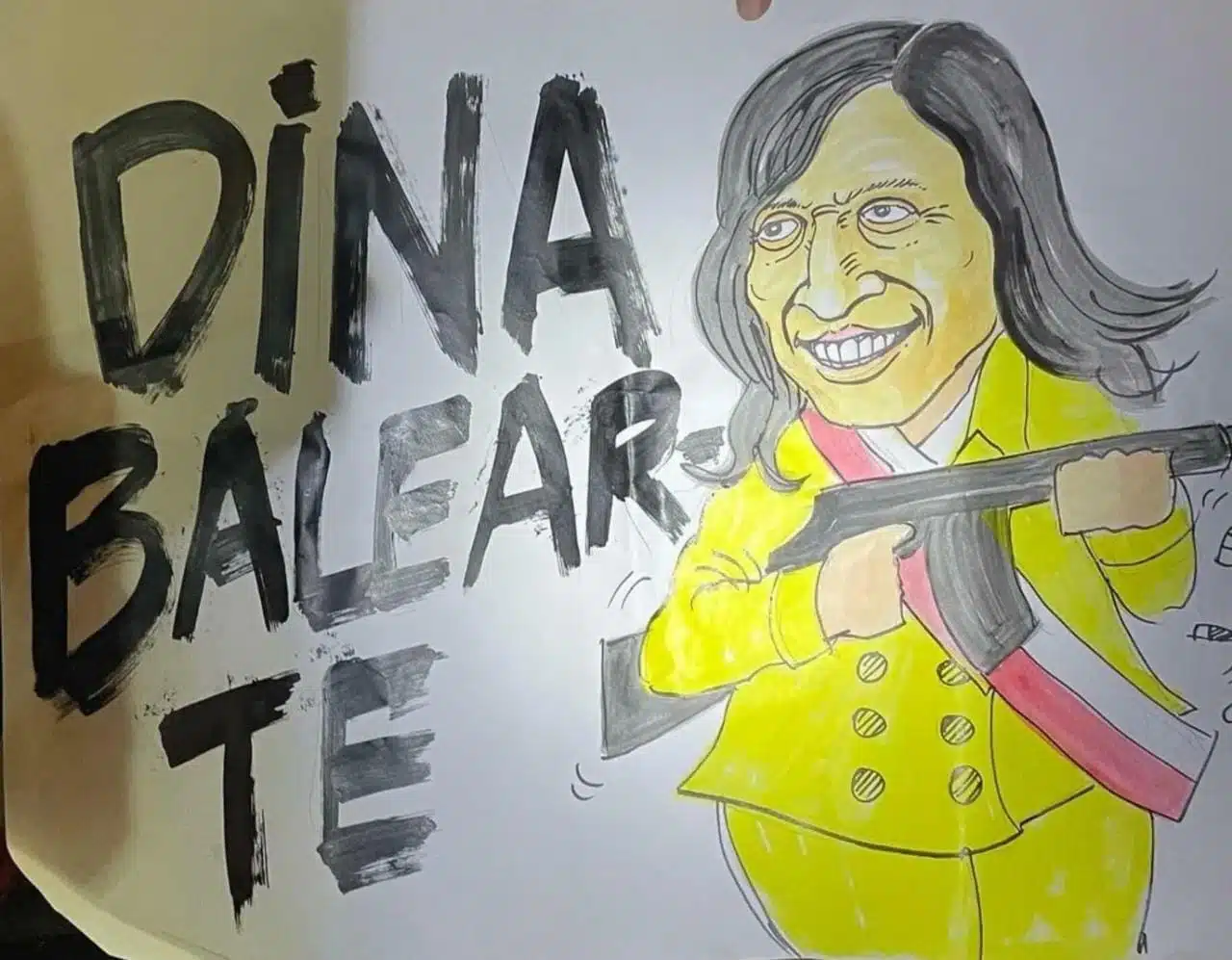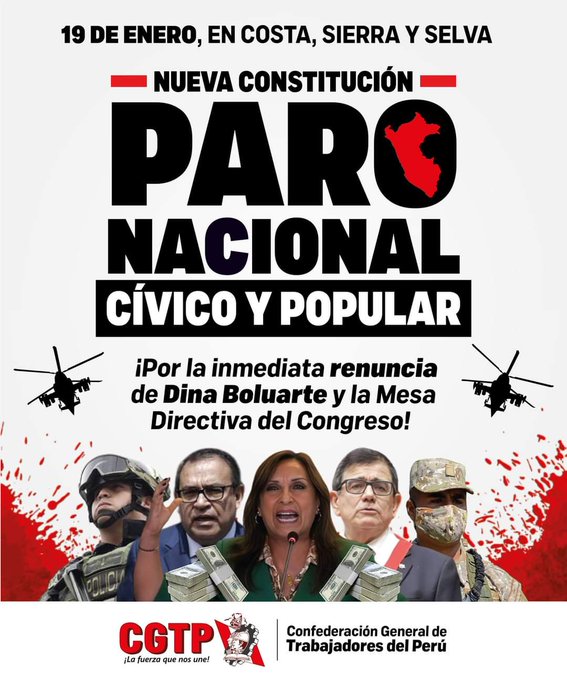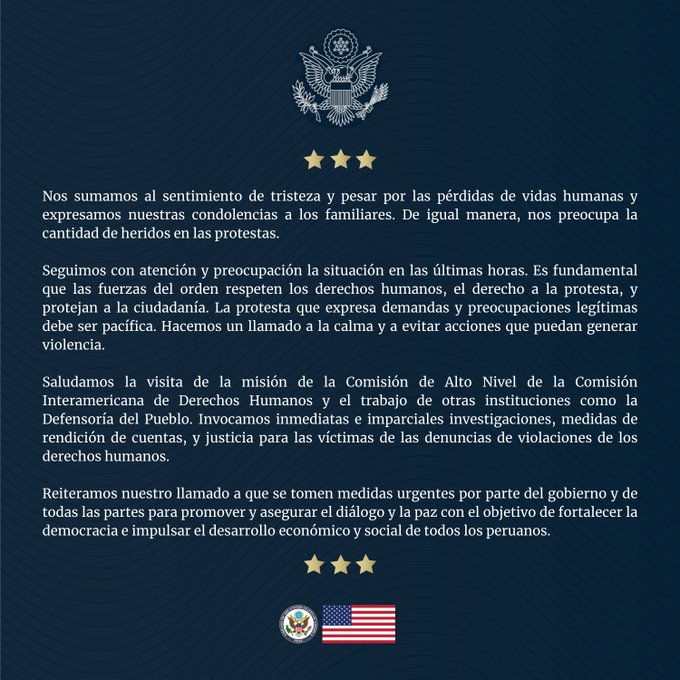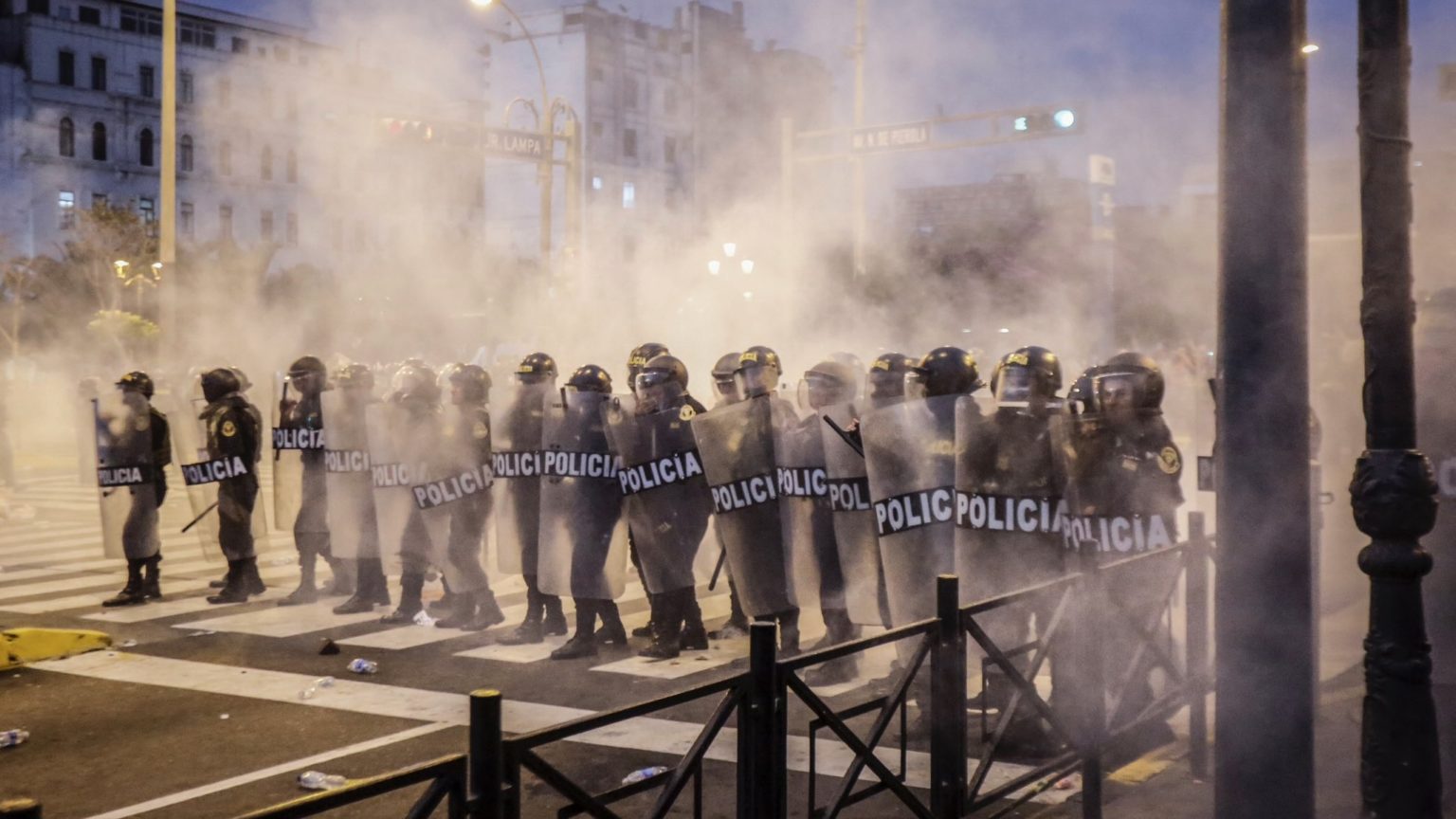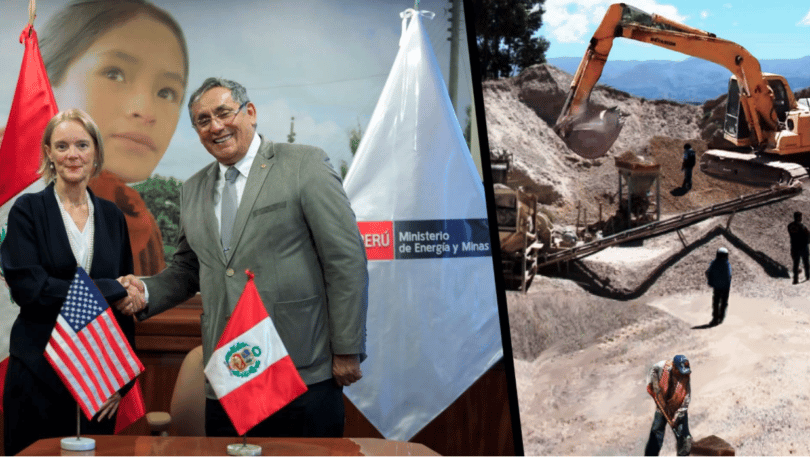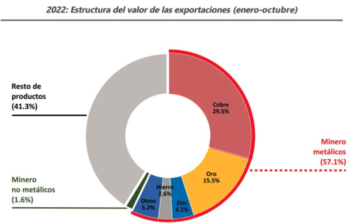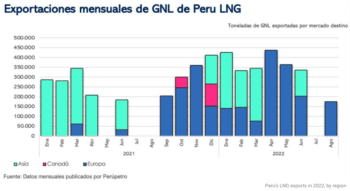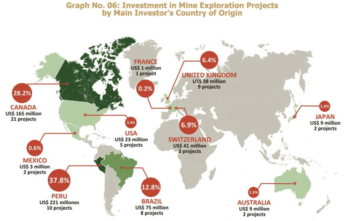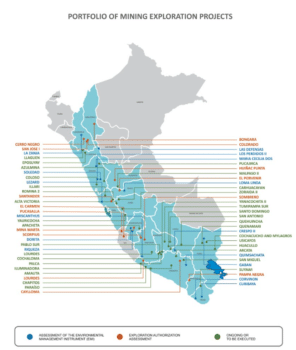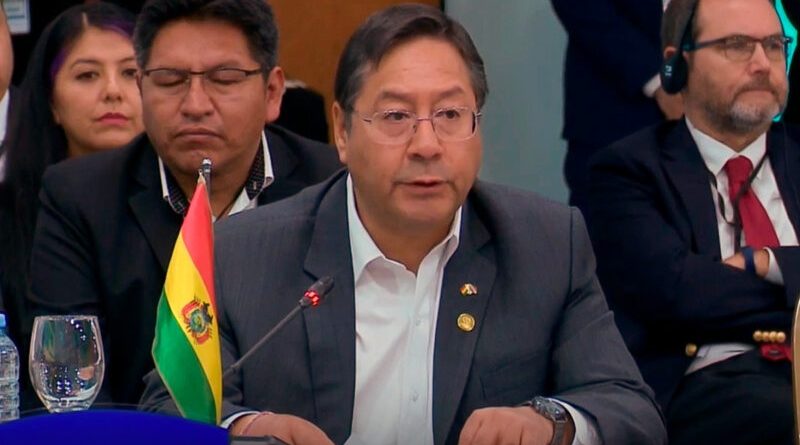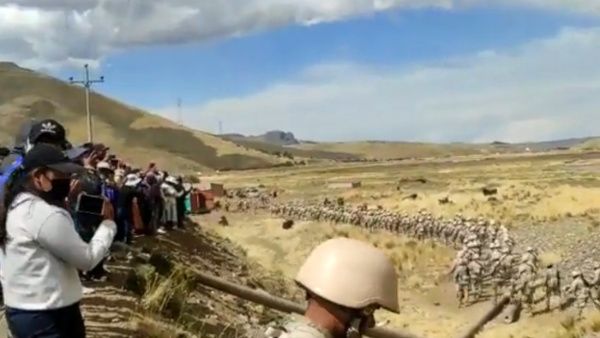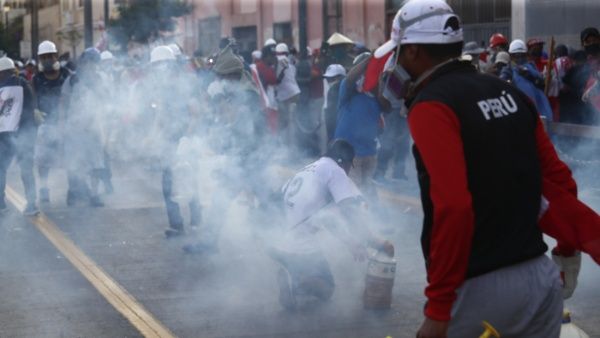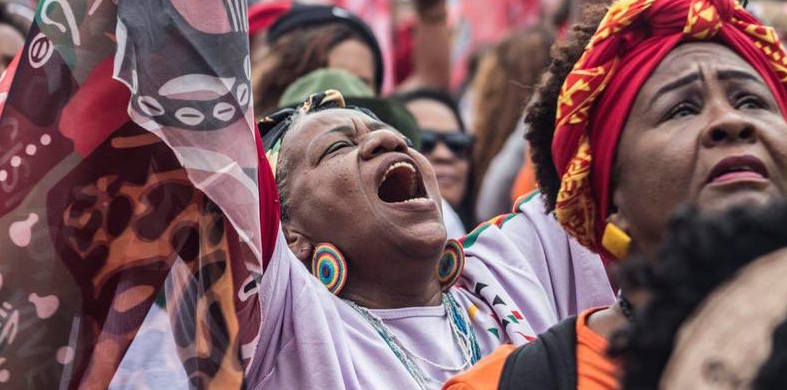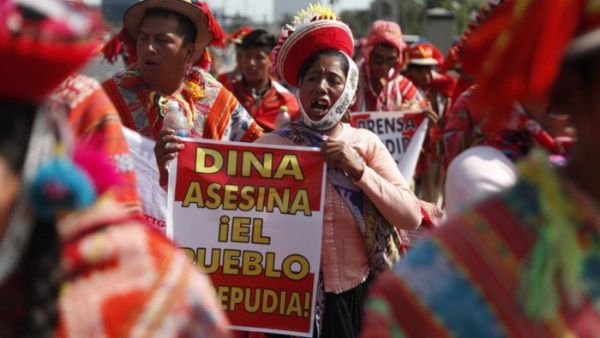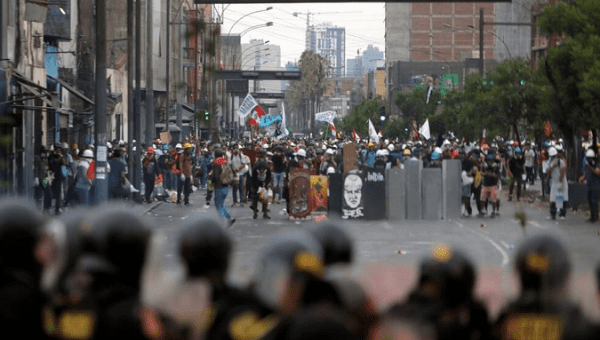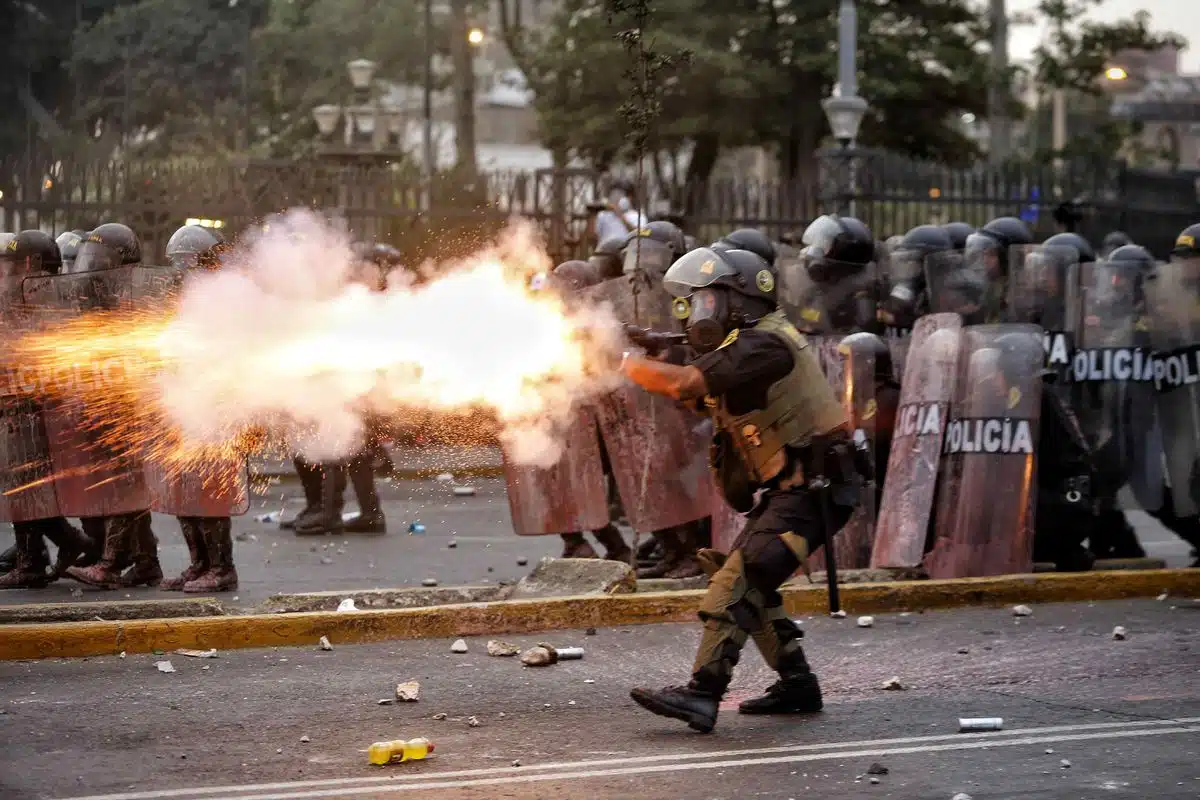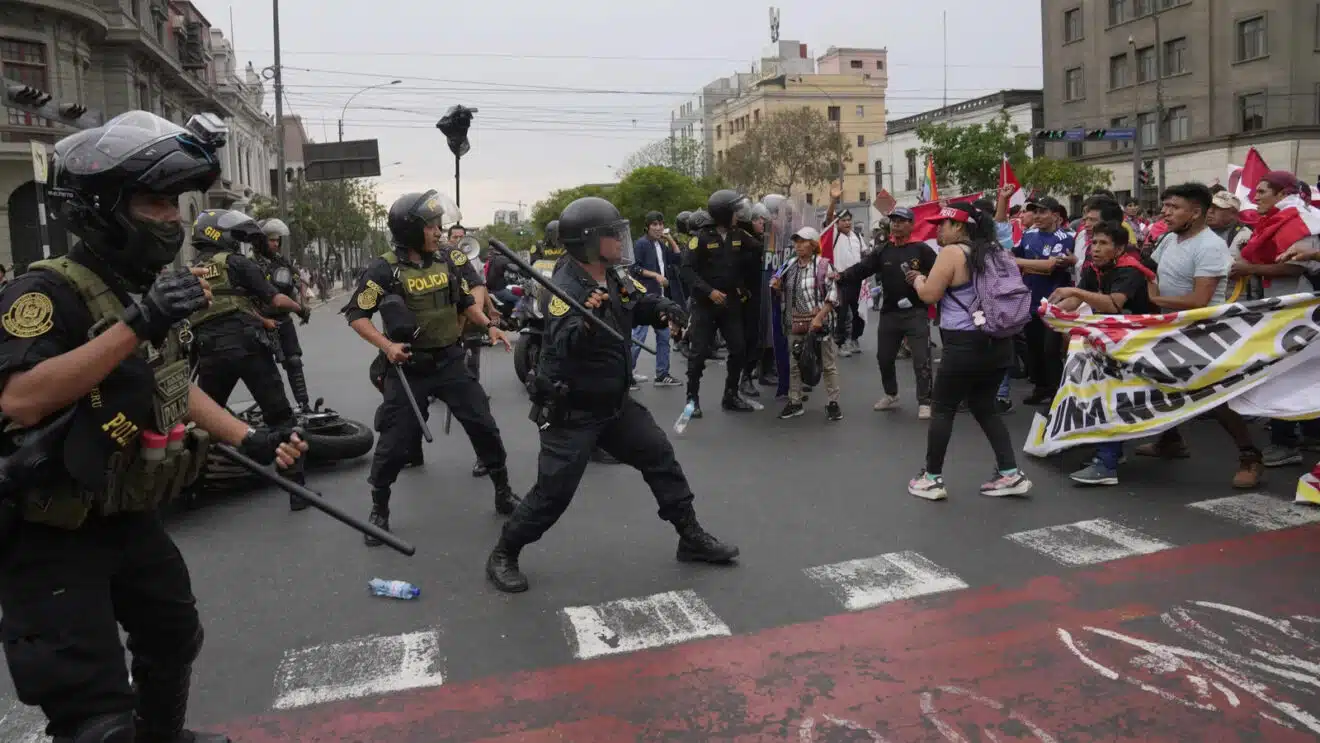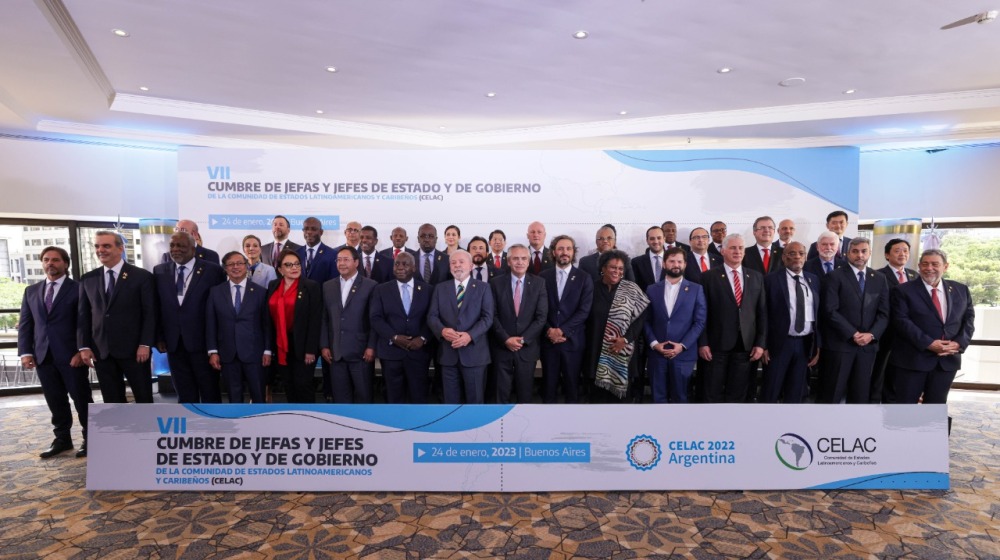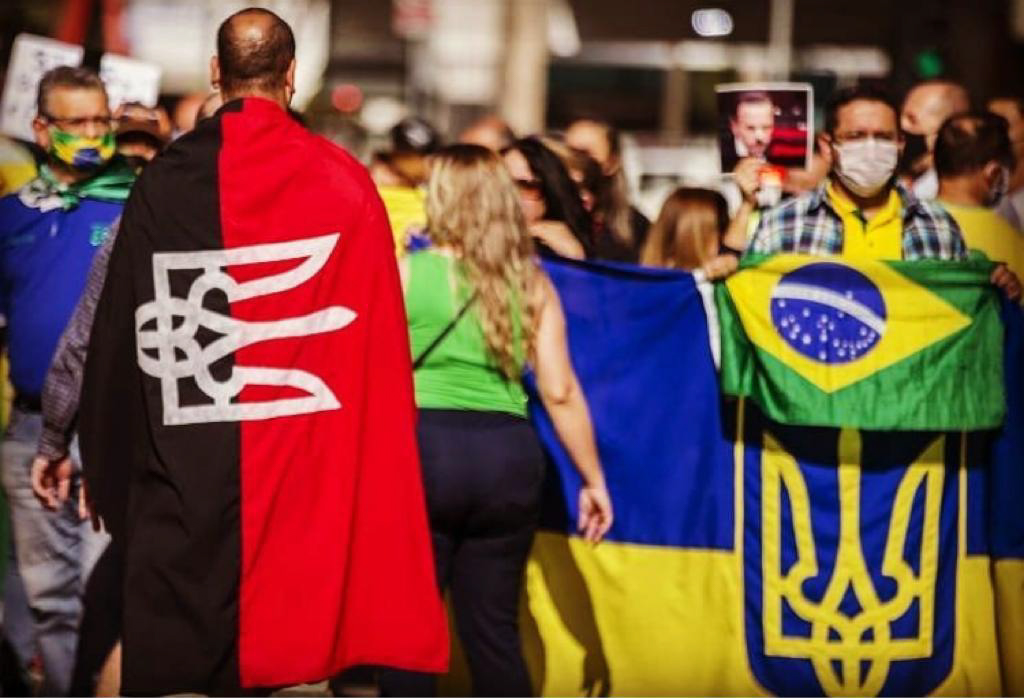Peru Armed Forces Chief Announces Unblocking of Country’s Roads

Protesters clash with the police during a new day of marches against the presidency of Dina Boluarte, today in Lima | Photo: EFE / Antonio Melgarejo
Published 26 January 2023
The head of the Joint Command of the Armed Forces, General Manuel Gómez de la Torre, announced today operations to clear roads blocked in various regions of Peru by opposition protesters.
In statements to reporters, the high military chief pointed out that “the forces of order have to reopen all our roads to the free movement of citizens.”
Regarding the sending of troops and armored cars to the South Andean region of Puno, the main stronghold of the protests, he said that they arrive “to complete the troops and fulfill the task” of unblocking the roads.
Asked about how he will manage to clear the blocked roads, which the Police have not been able to do, the military chief replied that it will consist on “talking to the people, convincing the people, explaining to the people and proceeding”, without further details.
He refrained from saying how long the unlocking will take and, regarding the situation in Puno, he said that events such as the burning of police stations have occurred there and there is a worrying outlook.
Extreme right-wing congressmen demand almost daily the Armed Forces, which have remained in the background with limited interventions, enter fully to impose order.
https://libya360.wordpress.com/2023/01/ ... -s-troops/
The Superintendence of Land Transport (Sutran) reported in its daily report that 88 roadblocks have been registered in 31 provinces and the Ombudsman’s Office reported concentrations and marches in five provinces and strikes in another five.
New blockades today closed the important Central Highway, which connects Lima with the Central Andean and Central Amazonian regions that supply the Peruvian capital with vegetables and fruits.
The protests demand the resignation of President Dina Boluarte, prompt general elections and a referendum on the possible calling of a constituent assembly.
In its two waves, the demonstrations of discontent accumulate a total of 46 deaths from firearms impacts, a policeman lynched and 10 civilian deaths.
Congresswoman Sigrid Bazán lamented the fact that the demands of peaceful protests are not met and the claimants have to resort to force and have to die to be heard.
https://www.telesurenglish.net/news/Per ... -0022.html
*************
Peru: Boluarte, in Favor of Early Elections in 2023

President-designate Dina Boluarte ruled out a Constituent Assembly in the framework of early elections. Jan. 27, 2023. | Photo: Twitter/@ElToqueDeDiana
Published 27 January 2023 (15 hours 8 minutes ago)
The South American country continues to live in a tough scenario of protests, blockades, and police repression that has resulted in the death of more than 50 people.
On Friday, Peru's president-designate, Dina Boluarte, asked Congress to bring forward general elections to December 2023, a proposal presented the day before by Congressman Hernando Guerra García.
"I call on Congress so that if (the parties) Fuerza Popular and Alianza para el Progreso are asking for what they had already presented (electoral advance to 2023), that this proposal, which has no conditions and which will get us out of the quagmire in which we are, be assumed in that sense," said Boluarte.
The President-designate recognized the initiative of Fuerza Popular (extreme right), the party organization of Keiko Fujimori. According to Boluarte, she had discussed the issue with the Justice Minister and with the Premier so that the elections could be moved forward in the electoral technical term, to December 2023.
In this regard, Boluarte said that a citizens' referendum to consult on the possibility of a Constituent Assembly within the framework of early elections is ruled out.
We call upon the Peruvian Congress within the framework of its powers and faculties, to prioritize and place the debate on advancing the elections in the shortest reasonable period of time, and in this way contribute to return social peace to the whole country.
The plenary of the Congress is scheduled to debate this Friday the advancement of the elections for this year. The legislature had already approved in the first vote such an advance to April 2024.
However, Peru continues to live a harsh scenario of protests, blockades and police repression that has resulted in the death of more than 50 people. The protests broke out on December 7, following the dismissal and arrest of leftist President Pedro Castillo and the inauguration of Dina Boluarte.
It is in this context that Boluarte called on Congress to reach a consensus on the issue. As soon as the Congress sets the advance of the elections "immediately we, from the Executive, will be calling those elections," said the president-designate noting the transitional nature of her government thus, "she does not want to perpetuate herself in power."
https://www.telesurenglish.net/news/Per ... -0017.html
********
Bolivia Rejects De Facto Peruvian President’s Claims of Foreign Interference
JANUARY 27, 2023
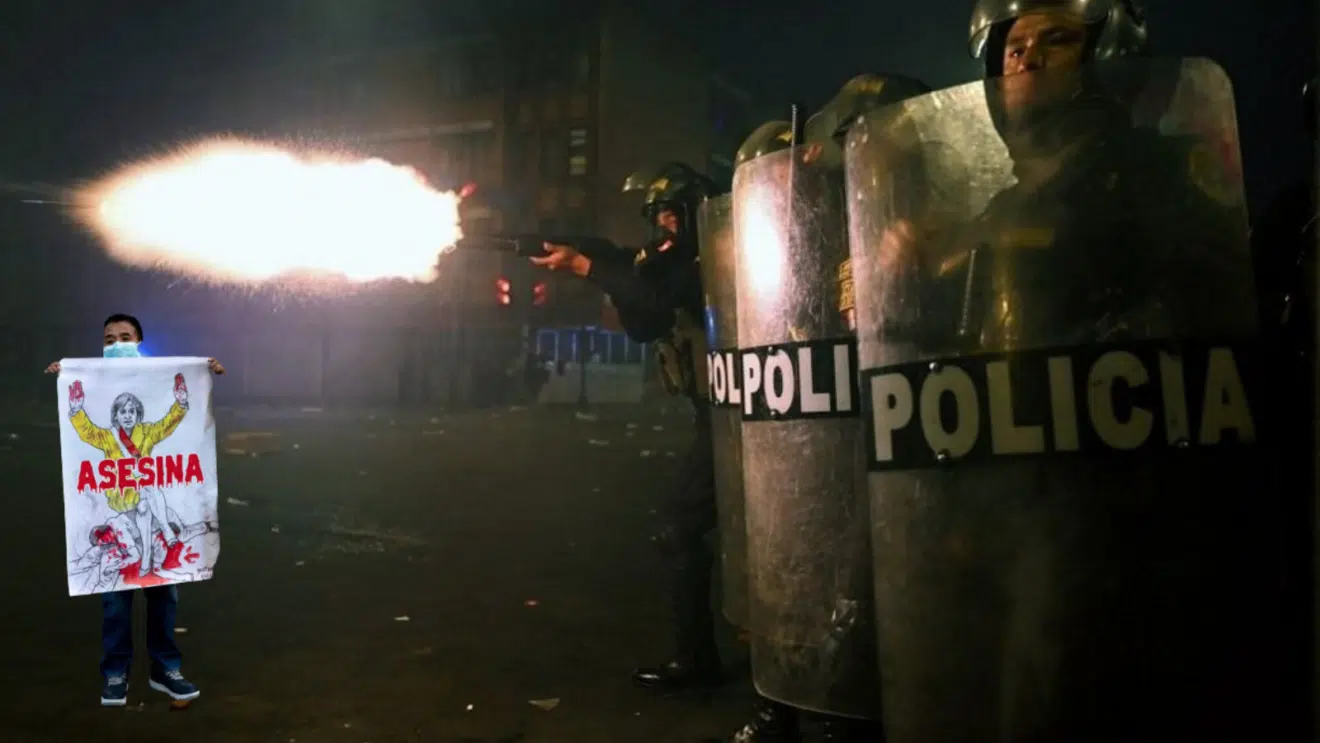
Photo composition showing Peruvian repressive forces shooting at protestors (Photo: Ernesto Benavides/AFP) blended with an image of a Peruvian protester holding a banner with a cartoon of Dina Boluarte stained in blood and a caption reading "asesina" (murderer). Photo composition: Orinoco Tribune.
Bolivian authorities reject Boluarte’s accusations of Bolivia sending ammunition to Peru and highlight human rights violations by the Peruvian de facto ruler.
On Tuesday, January 24, de facto Peruvian President Dina Boluarte said that her government had received “unofficial information” indicating that some of the deaths in Peru’s heavily repressed protests were the result of dumdum (expanding) bullets. She remarked that this type of weapon could have entered through the border with Bolivia.
Boluarte accused the Ponchos Rojos indigenous group of being involved in the entry of arms and ammunition from Bolivia to Peru to arm protesters.
On Thursday, January 26, Bolivian Government Minister Eduardo del Castillo declared that “there is no diversion of arms from the Plurinational State of Bolivia to the Republic of Peru. That version is totally untrue.”
Minister Castillo warned of the excessive use of violence during the protests in Peru and the “flagrant violation of human rights” by Boluarte’s regime, dismissing her accusations as a “smoke screen” to “hide” this situation.
How did the Peru-Bolivia tension begin?
Boluarte has been accusing Bolivia of interference since Bolivian President Luis Arce highlighted “the people’s struggle” to “recover democracy” in reference to the protests in Peru.
However, the Bolivian authorities have reiterated that they cannot remain silent in the face of the critical situation in Peru. According to the Ombudsman’s Office, 57 people have been killed since the protests began after the ousting of former President Pedro Castillo in December 2022.
On Thursday, January 26, Peru’s Congress declared former Bolivian President Evo Morales persona non grata for criticizing Boluarte’s repressive policies. In fact, on January 9, the Peruvian Ministry of the Interior prohibited the entry of Morales and eight other Bolivians at the request of the de facto president.
https://orinocotribune.com/bolivia-reje ... erference/
**************
US Lawfare and the Destabilization of Latin America
Posted by INTERNATIONALIST 360° on JANUARY 25, 2023
Brian Mier
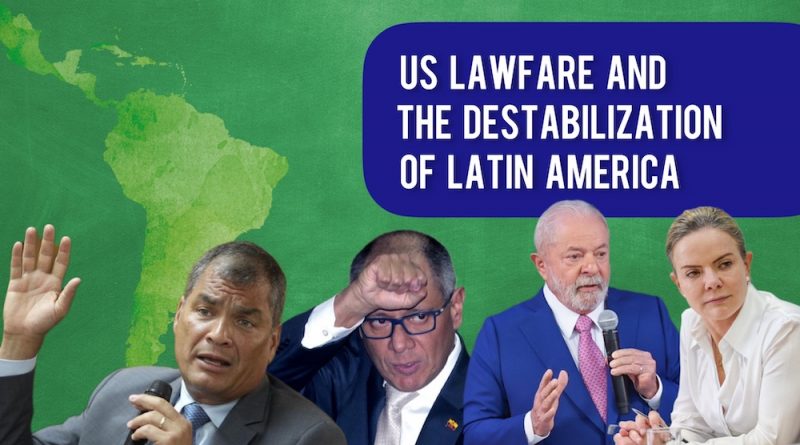 Brazil-based reporter and author Brian Mier outlines the strategy of lawfare and how it has been used in Latin America, particularly in the Lava Jato investigation.
Brazil-based reporter and author Brian Mier outlines the strategy of lawfare and how it has been used in Latin America, particularly in the Lava Jato investigation.
“Lawfare is the use of the law as a weapon of war, and it is the newest characteristic of 21st Century Combat,” – Colonel Charles Dunlap
Lawfare is the weaponized use of the law to annihilate a political or business enemy. Common tactics used in Lawfare include: forum shopping – when public prosecutors transfer a case to a jurisdiction with a friendly judge; excessive use and abuse of coerced plea bargain testimonies which are often the only evidence presented; suppressing evidence beneficial to the defense; and close collaboration with the media to create a public spectacle. One example of the later tactic is the time Brazilian Java Jato judge Sergio Moro ordered former Economy Minister Guido Mantega to be forcibly removed from his wife’s chemotherapy session and tipped the press off in advance, to create a media circus around his arbitrary arrest on charges he was later ruled innocent of.
There are indications that US DOJ use of Lawfare was piloted in the US before being rolled out through Latin America. In July, 2008, the US Department of Justice (DOJ) announced it was filing corruption charges against Senator Ted Stevens (R/AK) for allegedly receiving illegal reforms on a vacation property, damaging his reputation and causing him to lose his first election in over 36 years. Like future cases in Latin America, there was no material evidence presented, just a coerced plean bargain testimony made by a man who was trying to get out of jail. Months after the election, Stevens was ruled innocent, and in 2012 Judge Emmett Sullivan ruled two DOJ officials guilty of proprietorial misconduct. Nearly all of the tactics cited in the kangaroo court persecution of Ted Stevens would go on to be used against Brazilian President Luiz Inacio Lula da Silva within the ambit of the the US DOJ-backed Lava Jato (Car Wash) investigation. Coincidence or not, it is clear that these tactics would soon be exported throughout the Americas and the World, especially through partnerships with local law enforcement officials within the ambit of the Foreign Corrupt Practices Act (FCPA).
What is Lawfare?
As two members of Lula’s defense team, Cristiano Zanin and Valeska Martins wrote with legal scholar Rafael Valim in their 2021 book Lawfare: Waging War through Law it first appeared as a military term in the 1970s, but gained popularity in a series of texts by US Air force Colonel Charles Dunlap starting in 2001, when he wrote, “Lawfare is the use of the law as a weapon of war, and it is the newest characteristic of 21st Century Combat.”
Originally described as a weaponized use of international human rights law to criticize military campaigns by the US and Israeli governments on human rights issues and to weaken support for things like the war in Iraq, it was alluded to in the in the Pentagon’s March, 2005 National Defense Strategy, which refers to law as “the weapon of the weak who use international legal cases and terrorism to usurp America.”
Soon, however, military strategists began suggesting that Lawfare could be more than just something that the US government had to defend against and that it could also benefit national security, being preferable to expensive and destructive forms of war, and more neutral definitions of the term began to emerge. Dunlap later wrote that Lawfare could be converted into a “strategy of using or misusing law as a substitute for traditional military means to achieve military objectives.”
In 2016, Orde Kittre published the book Lawfare: law as a weapon of war and, based on the ideas of Dunlap, tried to perfect the concept of Lawfare by breaking it into two elements: 1) the use of the law to create effects similar to those achieved in conventional military actions; and 2) actions motivated by the desire to weaken or destroy an adversary.
As international attention drew to the kangaroo court procedure initiated against former Workers Party Brazilian President Lula da Silva in 2016, his defense team began referring to it as a form of Lawfare. As Martins told this author in an interview conducted in 2018, “when people say we are politicizing the defense, this is a lie because, in reality, this is a technical diagnosis. When we understand that, technically speaking, there is no material evidence, that the accusations are illogical, that the legal arguments are misrepresented, we come to the unequivocal conclusion that we are dealing with a process of Lawfare.”
As they worked with international human rights lawyers to publicize Lula’s plight, Zanin, Martins and Valim created their own definition of the term: the abuse and misuse of the law in a violent manner to conduct political persecution.
The law was certainly abused during the political persecution of politicians throughout Latin America within the ambit of the Lava Jato investigation, which started in 2014 as collaboration between the US Department of Justice (DOJ), the Securities Exchange Commission (SEC), the Swiss Federal Police and a local district attorneys office and judge based out of the conservative Brazilian city of Curitiba. The investigation crippled Brazil’s national development project, bankrupted many of its largest companies, transferred billions of dollars in fines to the United States and ultimately resulted in the illegitimate presidency of a neofascist former army captain named Jair Bolsonaro who is currently facing genocide charges in the International Criminal Tribunal in the Hague. Initially presented to the US media as a legitimate partnership within the ambit of the Foreign Corrupt Practices Act (FCPA) through a series of 2016 press releases by the Department of Justice itself, it later came out that investigators violated national sovereignty laws by engaging in secret, bilateral communications, including years of secret meetings between Brazilian prosecutors and a group of 18 FBI agents led by Leslie Bakshies.
The Foreign Corrupt Practices Act
The Foreign Corrupt Practices Act (FCPA) of 1977, is a US federal law that was originally conceived to prohibit US companies from committing acts of bribery overseas. Twenty years later, a modified version of the law was incorporated into an international treaty, the OECD Anti-Bribery Convention of 1997, which enabled the Securities and Exchange Commission (SEC) and Department of Justice (DOJ) to act in any signatory nation in consort with local authorities. At this point, according to the modified terms of the law, these international partnerships enabled US authorities to investigate any foreign company or individual located in a Convention signatory nation that has a US bank account, owns real estate in the US, has stock traded in the US, or even that has ever conducted any type of transaction in US dollars, as long as the investigation is conducted in partnership with local law enforcement officials. It was the FCPA, for example, that enabled FBI agents to raid FIFA headquarters in Zurich in 2015 and arrest several non-US citizens on foreign soil.
In his academic paper, “The uncomfortable truths and double standards of bribery enforcement,” legal scholar Mike Koehler shows how the US government selectively uses the FCPA to advance its own objectives. According to Koehler, uncomfortable truths that weaken the US moral authority to act as international anti-corruption police include: how the US government actively participates in bribery; how the highest levels of the US government knowingly engage in and support private bribery; how the identity of the alleged bribe payer influences the US government’s enforcement of bribery laws; the subtle difference between US government and private sector attempts to influence foreign government action; and how the US government employs overblown and inconsistent rhetoric regarding bribery enforcement.
It’s common knowledge that the CIA gave away bags of money to government officials in Afghanistan. So why would the US Department of Justice (DOJ), the US Securities and Exchange Commission (SEC) and the FBI be so worried about corruption in Latin America that the US government would prioritize the issue in the 2017 National Security Strategy if it isn’t political?
The fact that Brazil signed the Anti-Bribery Convention in 1997 enabled the DOJ to work as a partner—some critics argue it took the lead—in Lava Jato, levying billions of dollars in fines on Brazilian companies in civil cases, generally based in the Southern New York Court District. In 2015, Lava Jato judge Sergio Moro bankrupted Brazil’s five largest engineering and construction companies by refusing to treat them as too big to fail – like the US government did with Goldman Sachs during the subprime mortgage crisis – and paralyzed all of their operations for 6 months due to the alleged actions of a few of their business executives. Studies show that this arbitrary action by a district court judge in Curitiba caused 500,000 direct and 3.6 million indirect job layoffs and a 2.5% drop in GDP growth in 2015, severely damaging the reputation of President Dilma Rousseff during the lead up to the April, 2016 parliamentary coup, which was also helped by Lava Jato Judge Sergio Moro’s illegal wiretapping of a conversation between President Rousseff and former President Lula, which he edited to make her look as bad as possible then shared with Brazil’s largest TV network, O Globo, on the eve of the impeachment vote. The Lava Jato investigation was also responsible for the election-year, arbitrary political imprisonment of ex-President Lula for reforms to an apartment the prosecutors were unable to prove he ever owned or set foot in. Although the signs of judicial and prosecutorial overreach in Lava Jato were crystal clear by 2016, after hacker Walter Delgatti (who is currently facing a 300 year prison sentence) shared leaked Telegram conversations showing illegal collusion between Lava Jato prosecutors and the judiciary with the Intercept, Brazilian Federal Police, the Supreme Court and Lula’s defense team, all doubts about the criminal nature of Lava Jato were put to rest.
Lava Jato started in Brazil, but soon, with support from the US DOJ, it expanded across Latin America and Lusophone Africa and was used used to attack politicians in other countries where Brazilian engineering and construction companies like Odebrecht and OAS operated. Attempts to use it against Venezuelan politicians failed due to the wise decision of that government to never sign the FCPA agreement, but dozens of politicians in other countries were targeted. Here are a few examples:
Jorge Glas – Ex-Vice President of Ecuador
Arrested in October 2017, Progressive International board member Jorge Glas was sentenced to 6 years in prison by Ecuadoran Lava Jato prosecutors for allegedly receiving bribes from Odebrecht construction company, based on the plea bargain of a single, corrupt business executive, José Conceição Santos, who received a reduced sentence and partial asset retention in exchange for his testimony. He was released on parole in November, 2022.
Mauricio Funes – Ex-President of El Salvador
In June, 2018, a judge in El Salvador issued an arrest for former President Mauricio Funes and 30 top members of the FMLN, based on coerced plea bargain testimony transcripts supplied by Brazil’s Lava Jato task-force, taken from corrupt businessmen who received sentence reduction and partial retention of their illicit assets in exchange for their testimony. Already living in Nicaragua at the time, they were unable to arrest him and he lives there to this day.
Rafael Correa – Ex-President of Ecuador
In April, 2020, an Ecuadoran kangaroo court sentenced Rafael Correa to 8 years in prison and barred him from running for office for 25 years based in part on coerced plea bargain testimony from an Odebrecht executive that was shared by the Lava Jato Taskforce. With Ecuador currently in chaos, the former President has been living in political exile in Belgium since 2017.
Gleisi Hoffmann – President of Brazilian Workers Party
After Lula was illegally barred from running for President in September, 2018, one of the names cited to replace him was Gleisi Hoffmann. A rising star in the PT, the Lava Jato taskforce tried to annihilate her political career by frivolously accusing her of receiving illegal campaign donations from Odebrecht without any material evidence, while using illegal leaks to create a media circus over an arbitrary search and seizure operation in her house in 2016. Since Hoffmann was a Senator at the time, her case was taken directly to the Supreme Court where she was ruled innocent by a vote of 11-0, due to, as in the case of Lula and so many other victims of Lava Jato, a total lack of material evidence in a case that was entirely built on coerced plea bargain testimony by corrupt business executives who changed their story several times before receiving massive reduction of prison sentence, transfer to house arrest and partial retention of millions of dollars in illicit assets.
Lava Jato – an investigation which has now been proven to be critically flawed due to criminal collusion between chief judge and prosecutors – has spread its tentacles all over the world. In Mozambique, it resulted in the arrest of former Transportation and Communications Minister Paulo Zacula, and Lava Jato was also used to accuse prominent politicians of corruption in the Dominican Republic, Panama and Angola. As Lula defense lawyer Valeska Martins emphasizes, Lawfare is a tactic that can be used against any political enemy from across the political spectrum. Three right wing former Presidents of Peru were sentenced to prison due to coerced plea bargain testimonies by corrupt, imprisoned Brazilian businessmen, with former President Alan Garcia committing suicide on the day they were coming to arrest him him.
Conclusion
Although frivolous criminal investigations against politicians and business leaders as tactics to gain an upper hand over rivals has certainly been engaged in as long as politics and business have existed, the concept of Lawfare as a hybrid war tactic really begins in the 21st Century, in actions that seem to have been piloted by the US DOJ within the US itself before being applied selectively to advance US business and political interests abroad. The US Foreign Corrupt Practices Act, initially created in the 1970s a means to reduce the ability of US companies to bribe foreign officials overseas – in theory strengthening sovereignty in countries around the world – has been transformed into a weapon used as justification to arrest foreign political leaders and bankrupt foreign competitors to US corporations. Furthermore, the we can see the toxic legacy of this imperialist strategy in the form of local initiatives, unrelated to the FCPA, that use similar Lawfare tactics to annihilate political enemies such as Argentina’s Vice President Cristina Kirchner. With a new round of electoral victories of the working class left in Latin America, it is more important than ever to develop defense strategies against Lawfare.
https://libya360.wordpress.com/2023/01/ ... n-america/
***************
Mass mobilizations continue in Peru against Dina Boluarte
According to the National Human Rights Coordinator of Peru (CNDDHH), in the past 50 days of social protests, 56 people, including seven minors, were killed and 912 people were injured
January 27, 2023 by Tanya Wadhwa
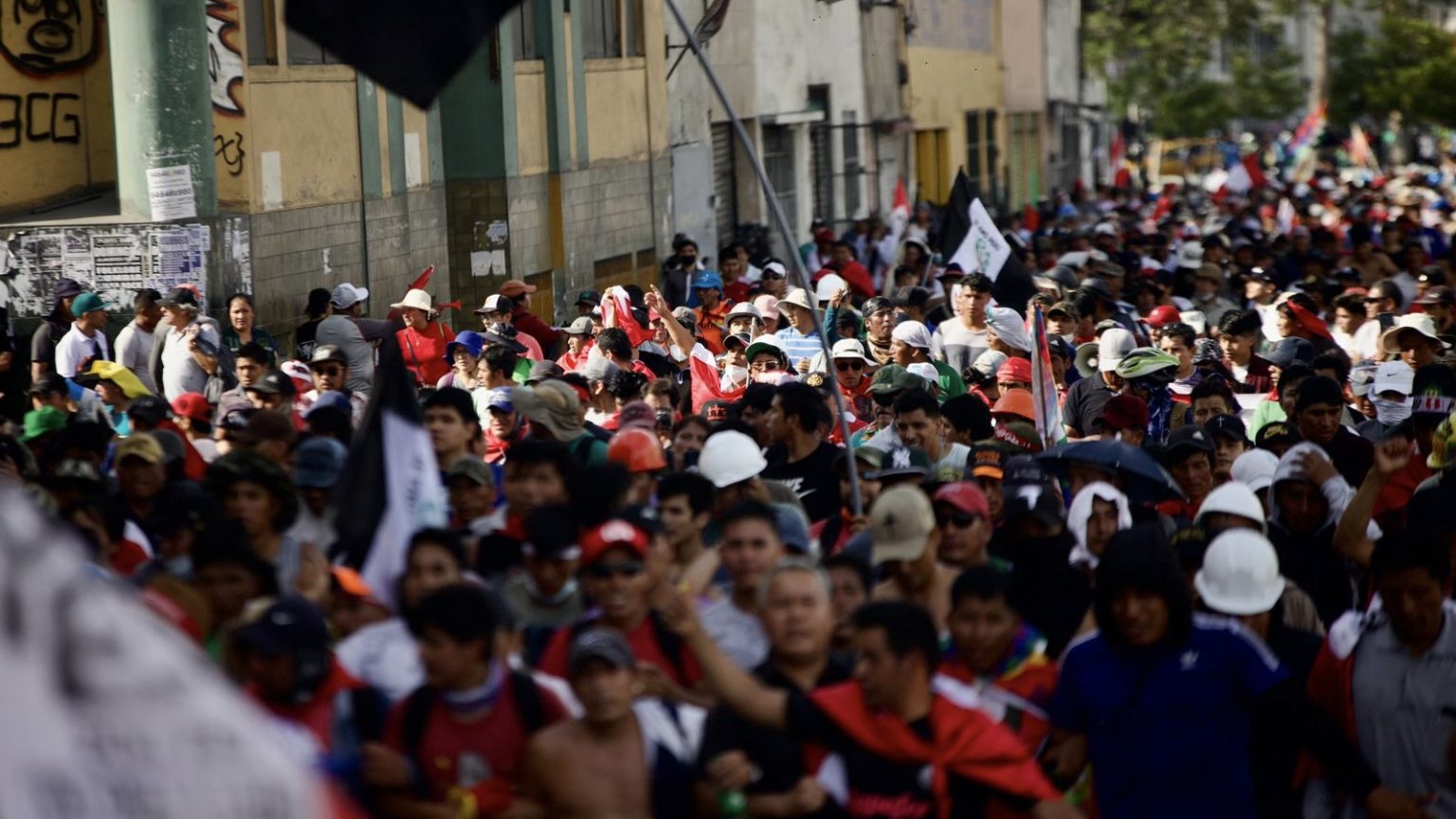
Thousands of Peruvians held a new peaceful march in the capital Lima, demanding the resignation of de-facto president Dina Boluarte, early general elections, and a new constitution on January 26. Photo: Juan Zapata/Wayka
In Peru’s capital Lima, massive mobilizations have occurred daily for the past week to demand the resignation of de-facto president Dina Boluarte, the closure of the right-wing dominated Congress, early general elections, and a new constitution through a Constituent Assembly. Peaceful mobilizations were also recorded in Piura and Tacna regions.
On Thursday January 26, protesters marched along the Panamerican highway from the north of Lima to Plaza Dos de Mayo and Plaza San Martín. The marches in the capital have seen widespread participation from students and workers in the city, but have been largely composed of the delegations of peasant, Indigenous, and trade union organizations who arrived to Lima from Puno, Arequipa, Ayacucho, Cusco, Huancavelica, and other regions to bring their demands to the seat of government. The regions which sent delegations have seen high levels of violent repression and high death tolls over the past month so they have also been calling for an end to the brutal police and military repression, justice and reparations for the victims.
The marches in the city center have also been met with violent repression. Day after day, the National Police have deployed hundreds of officers who launch tear gas canisters and fire pellets to disperse the crowd. Dozens, including human rights defenders and journalists, have been injured.
Boluarte calls for truce, but continues repression
On January 25, the de-facto government extended the curfew in the Puno department for 10 days, while increasing militarization of the region. The measure is a part of a 30-day-long state of emergency imposed on January 14, in Puno, Lima, and Cusco, among other parts. The decision came one day after Boluarte called for a national truce and urged the protesters to engage in dialogue, in an address to the nation.
Additionally, on January 26, the Defense and Interior Ministries announced that the National Police and the Armed Forces will carry out an operation to unblock the roads and highways that have been blocked by protesters across Peru as a measure of protest.
“We call on those who persist in these illegal measures to desist from it, allow the peaceful unblocking of the roads and avoid confrontations with the forces of order that will act in defense of legality,” the ministries said in an official statement.
Meanwhile, on Friday, January 27, Boluarte supported a bill presented the day before by far-right congressman Hernando Guerra García to advance general elections to December 2023. On Tuesday, in her address, she said that she would ask Congress for an earlier election date. On December 20, 2022, Peru’s Congress approved a bill to advance general elections to April 2024, and to conclude the presidential and legislative terms in July of the same year. The protesters are demanding that the elections are brought forward and organized in 2023.
The left-wing Free Peru party, in a statement on January 27, endorsed holding new elections, but also advocated holding a referendum for the Constituent Assembly.
“These roles and power relations, between those who govern and those governed, are reflected in the Political Constitution of each country, which is why we must change the current Political Constitution of Peru. The new Constitution must be born from a Constituent Assembly, where the people participate, propose, project and approve their laws that should govern society, seeking the well-being of all and not of the small minority,” said Free Peru.
Human rights violations in Peru
The National Human Rights Coordinator of Peru (CNDDHH), on January 26, presented a report on the extensive human rights violations committed by the security forces in the past 50 days of social protests. The report noted that 56 people, including seven minors, were killed and 912 people were injured in the past one and a half months. The report highlighted that of the fatal victims, 46 died “due to the direct responsibility of the state.”
The report documented the cases of extrajudicial executions that were committed in social protests, the use of prohibited weapons such as AKM rifles, by State agents, which denies the official version that “the protesters killed each other.”
Torture by the police was also documented and they highlighted a case from Andahuaylas, when a group of 8 people were detained on December 12 and were brutally beaten during their imprisonment.
The CNDDHH also warned that massive arbitrary detentions have been taking place. It reported that at the National University of San Marcos alone, 193 people were detained. It also reported that the authorities are using accusations of terrorism against those who mobilize, and the police are hindering the defense process of the detainees as well as the journalistic work.
Boluarte’s conflict with Honduras, and other neighboring countries
Despite the report and without critical reflection of its actions, on January 26, the Boluarte government withdrew the ambassador of Peru in Honduras after Honduran President Xiomara Castro expressed her concerns about the crisis in Peru.
The Peruvian Foreign Ministry explained, in a tweet, that the measure was taken “in response to the unacceptable interference in internal affairs of President Xiomara Castro in her speech at CELAC, ignoring the constitutional Government of President Dina Boluarte.” The ministry added that the bilateral relations between the two countries will be maintained through the chargé d’affaires.
On January 24, Honduran President Xiomara Castro, during her speech at the 7th Summit of Heads of State and Government of the Community of Latin American and Caribbean States (CELAC), condemned the legislative coup in Peru and expressed her solidarity with ousted President Pedro Castillo, calling him “legitimate, elected” president and demanding his “immediate release.”
In addition to Castro, Bolivian President Luis Arce, Chilean President Gabriel Boric, Colombian President Gustavo Petro, and Mexican President Andrés Manuel López Obrador also criticized the brutal repression of the social protests and human rights violations in Peru.
On January 25, the ministry announced that it would call the ambassadors of Peru in Argentina, Bolivia, Colombia and Mexico for consultation, due to the “interference in internal affairs by the highest authorities of the aforementioned countries.” It also conveyed to the Chilean Ambassador the discontentment of the Peruvian government with President Boric’s statements at CELAC, describing them “disrespectful towards President Dina Boluarte.”
At the same time, the plenary session of Congress, with 74 votes in favor, 40 against and 4 abstentions, approved a motion declaring former Bolivian President Evo Morales a ‘persona non grata’ and prohibited him from entering Peru, considering that he makes statements and demonstrations that allege to be interference in Peruvian internal affairs.
The move to endanger diplomatic ties across the region has been widely condemned by leaders.
Condemnation of Boluarte regime at CELAC summit
Peru was a central topic of discussion at the CELAC summit, despite not making it into the final declaration.
President Arce said that “Bolivia is respectful, like all CELAC States, of International Law and non-interference in the internal affairs of states,” but added that “we cannot simply ignore a situation such as the serious political and social crisis that our brotherly people in Peru are experiencing.” He urged that the institutions of the Peruvian State work together with its people to “take the path of understanding to recover social and political peace in the country.”
President Boric asked the Boluarte government for a “change of course” in the face of the “unacceptable repression and violence.” “We cannot be indifferent when today in our sister nation of Peru, with the government under the command of Dina Boluarte, people who go out to march and claim what they consider fair end up being shot by those who should defend them,” said Boric.
President Petro also demanded the immediate release of Castillo, calling for an agreement on the basis of the Inter-American Commission on Human Rights to protect popularly elected heads of state who remain deprived of their liberty. “Why do we have to continue maintaining violations of the Inter-American system despite the fact that our governments signed the treaty in the past? Why do there have to be parliamentary and violent coups? Why are popularly elected presidents today in prison when they should be here at this table? Why are the political rights of any citizen violated by administrative and parliamentary authorities? when the letter that we all signed in 1972 does not allow the political rights of any citizen to be violated,” maintained Petro.
Similarly, President AMLO, in a video message sent to the summit, called for cessation of repression in Peru and the freedom of Castillo. “We must not leave the brotherly people of Peru alone, what they did with Pedro Castillo and the way in which they are repressing the people was an infamy. A communiqué must be jointly signed to demand that the repression cease, that dialogue be opened, that it be the people who decide in democracy, that is, in clean, free elections, about the destiny of Peru. No to authoritarianism and freedom to Pedro Castillo, because he is unjustly imprisoned,” said AMLO.
Castillo denounces repression, thanks leaders for solidarity in a letter
In a new letter shared on his Twitter account, Castillo denounced the repression and human rights violations committed by the Boluarte regime, and thanked regional leaders for their solidarity and condemnation expressed at the CELAC summit.
“I denounce the human rights violations that are being committed against my indigenous brothers, the repression in the streets by the military dictatorship of Boluarte, claiming more than 60 lives of compatriots and leaving 1,200 wounded. I pray that you raise your voice in all international forums, and do not allow a genuine space for Latin American integration to coexist with the current anti-democratic political regime that is usurping power in Peru today,” said Castillo.
“I appreciate the solidarity of the brother presidents who, in their speech, have kept in mind the human rights violations in Peru. To presidents Gustavo Petro, Xiomara Castro de Zelaya and Andrés Mauel López Obrador, for their firmness in condemning the dictatorship, my arbitrary detention and for demanding the constitutional guarantees of which I continue to be illegally deprived. To the presidents of Argentina, Cuba, Bolivia, Chile and Venezuela, who expressed their concern about the serious situation in our country,” he added.
Castillo also thanked Morales and expressed his solidarity with him. “My solidarity and gratitude to my brother Evo Morales, politically persecuted by the Boluarte dictatorship, who was prohibited from entering Peru. Evo has been a consistent political leader in defending himself with democracy and denounces the fascist government of Dina Boluarte, responsible for the bloodshed that Peru is mourning today,” he wrote.
https://peoplesdispatch.org/2023/01/27/ ... -boluarte/
*******
Peru Coup Government Opens the Door for Entry of U.S. Troops
Posted by INTERNATIONALIST 360° on JANUARY 27, 2023
W.T. Whitney Jr.
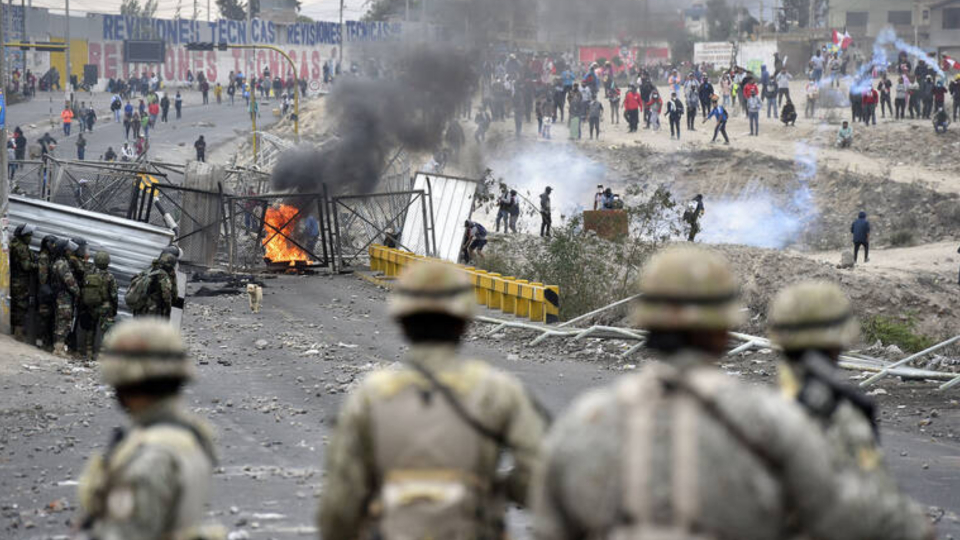
Soldiers attack protesters outside the Alfredo Rodriguez Ballon airport in Arequipa, Peru, Friday, Jan. 20, 2023. Protesters are seeking immediate elections, coup President Dina Boluarte’s resignation, the release of ousted President Pedro Castillo, and justice for the protesters killed by police. | Jose Sotomayor / AP
Critics of U.S. interference in Latin America and the Caribbean may soon realize, if such is not the case now, that Peru has a compelling claim for their attention. The massive popular resistance emerging now amid the political crisis looks to be sustainable into the future. Meanwhile, a reactionary political class obstinately defends its privileges, and the U.S. government is aroused.
This new mobilization of Peru’s long-oppressed majority population manifested initially as the force behind left-leaning presidential candidate Pedro Castillo’s surprise second-round election victory on June 6, 2021. It exploded again following the coup that removed Castillo on Dec. 7, 2022.
The politically inexperienced Castillo, a primary school teacher and teachers’ union leader in rural northern Peru, espoused a program of resisting both Peru’s corrupt and oligarchical elite and foreign exploiters. Castillo had begun his 2020 presidential campaign prior to aligning with a political party. His affiliation eventually would the Marxist-oriented Peru Libre (Free Peru) Party, which abandoned him during his presidency.
Castillo was the first leftist to be elected president of Peru. The candidate he defeated was Keiko Fujimori, standard-bearer of Peru’s oligarchs and militarists and daughter of dictator and former President Alberto Fujimori.
Castillo’s forced removal from office prompted massive popular resistance. Since then, small farmers, indigenous communities, social organizations, students, and labor unions have sustained a national strike. Concentrated in Peru’s southern provinces at first, and later spreading throughout northern regions, strikers have been blocking highways, city streets, and access to government offices and airports.
In their “March from the Four Corners” of Peru, protesters on Jan. 19 occupied Lima in what they called the “Taking of Lima.” They have filled streets and plazas, marched, and impeded access to government offices. They say they will stay. Lima residents and social movements have stocked food for them and, with the help of schools and universities, provided shelter.
Anthropologist Elmer Torrejón Pizarro, from Amazonian Peru, was marching on Jan. 19. He writes: “I saw no criminals next to me, much less terrorists. I observed young university students and mostly peasants, women and men from the south. I saw their faces, furrowed by the pain of life and death. They were next to me, their faces hard and burned by blows from life, from Peru. They were faces expressing generational hibernation of a country that, as a state, has failed.”
The protesters are demanding:
*the resignation of de-facto president Dina Boluarte,
*the liberation of the imprisoned Pedro Castillo,
*and the dismissal of a Congress dominated by right-wing and centrist political operatives.
They want new elections in 2023 and a popular referendum on instituting a Constituent Assembly. They, like Castillo, want a new constitution.
Left-oriented news sources haven’t reported reactions to the strike from Peru’s leftist political parties. The few websites of those parties that are accessible add little. The Communist Party of Peru Patria Roja, an exception, on Jan. 16 condemned the coup government as a dictatorship, called for a transitional government, and expressed support for the demands outlined above.
Popular resistance is one aspect of this crisis situation. The other is political repression. For weeks, the police and the military have been assaulting protesters throughout the country with lethal force. They have killed over 60 of them, wounded hundreds, and jailed hundreds more.
In Lima on Jan. 21, almost 12,000 police were in the streets blocking demonstrations and harassing residents and students; 14,000 more were otherwise engaged. The police that day violated a university autonomy law and entered San Marcos University where they arrested strikers sheltering there and students, over 200 in all.
The security forces and their handlers are heirs to repressors who, from Spanish colonization on, have repeatedly victimized masses of impoverished, mostly indigenous Peruvians. Peru experienced three prolonged military dictatorships during the 20th century.
In dealing with Castillo and the threat he represented, forces of reaction turned to softer methods. These centered on congressional maneuvering aimed at harassing Castillo’s ministers and blocking his government’s program.
Finally, the Congress demanded that Castillo resign, and immediately soldiers seized the president. He was charged with “rebellion and conspiracy” and will remain in prison for at least 18 months. He is held incommunicado.
When interviewed, Wilfredo Robles Rivera, the deposed president’s lawyer, spoke of a “parliamentary coup, a slow coup, a prolonged one organized on several fronts.” He explains that “It was a strategy that began even before President Castillo took office. The right wing … was pressuring election officials to recognize electoral fraud. An electoral coup, therefore. The true parliamentary coup began when Castillo became president.”
An earlier article by the present author elaborates on this terminal phase of Castillo’s downfall. Robles Rivera’s perspective appears in one of the addenda below.
Lastly, there is that aspect of Peru’s mounting crisis that relates to North Americans: U.S. intervention is possible.
Gen. Laura Richardson, head of the U.S. Southern Command, spoke to the establishment-oriented Atlantic Council on Jan. 19. In regard to Latin America, she mentioned “rare earth elements,” “the lithium triangle—Argentina, Bolivia, Chile,” the “largest oil reserves [and] light, sweet crude discovered off Guyana,” Venezuela’s “oil, copper, gold” and “31% of the world’s fresh water in this region.” She concludes, crucially: “This region matters. It has a lot to do with national security. And we need to step up our game.”
On Jan. 18, de facto President Dina Boluarte and her Council of Ministers informed Peru’s Congress that they were submitting for approval a draft legislative resolution saying, in effect, that Congress would be “authorizing the entry of naval units and foreign military personnel with weapons of war” into Peru.
Who but U.S. troops and military machinery would be first in line? The U.S. military is already familiar with deploying in Peru. And the day prior to Castillo’s removal from office, U.S. ambassador Lisa Kenna, a CIA veteran, was in the office of Peru’s defense minister, conferring.
She is persistent. On Jan. 18, Kenna conferred with Peru’s minister of energy and mining and his associates. Journalist Ben Norton attests to that minister tweeting about “a high-level institutional dialogue that day between Peru and the United States.” The minister expressed pleasure at “support from the North American government in mining-energy issues” and mentioned his government’s prioritization of the natural gas and energy sectors.
Presently all liquified natural gas produced in Peru goes to Europe. Energy supplies there are precarious due to U.S. anti-Russian sanctions. We imagine U.S. applause.
https://libya360.wordpress.com/2023/01/ ... -s-troops/
Political Earthquake in Argentina: Judicial Meddling and Political Uncertainty
Posted by INTERNATIONALIST 360° on JANUARY 26, 2023
Juan Martin Gonzalez Cabañas
 Recent events in Argentina and Latin America reveal that the traditional players and forces have lost the strategic political initiative, and are in permanent pursuit of readjusting the political map of the region in their favour, writes Argentine political scientist Juan Martin Gonzalez Cabañas.
Recent events in Argentina and Latin America reveal that the traditional players and forces have lost the strategic political initiative, and are in permanent pursuit of readjusting the political map of the region in their favour, writes Argentine political scientist Juan Martin Gonzalez Cabañas.
In the context of yet another chapter of judicial meddling in the regional politics of Ibero-America, a new political earthquake is taking place in Argentina, one that produces great uncertainty due to the statements of Cristina Fernández de Kirchner, in which she argued that she would be willing to renounce the continuation of her public aspirations
The events
On December 6, 2022, in the context of an already-altered Argentine political map, another earthquake was added: The Federal Court N°2, in an unprecedented verdict, sentenced Cristina Fernández de Kirchner (CFK) to 6 years of imprisonment in addition to a life sentence of disqualification to hold public offices. Such a conviction would be the result of a trial for irregularities in public works (specifically in the southern province of Santa Cruz).
Due to its characteristics, this judicial decision is unprecedented.
At the procedural level, the trial is flawed by irregularities. This aspect is, unfortunately, very common in the Argentine justice system, one of the institutions in the country with the worst image in the public opinion. In this latter regard, the Argentine public has recently been made aware of very serious, scandalous events.
These are the meetings at Lago Escondido and the football games at the hacienda “Los Abrojos”. At these scandalous gatherings and chats between judges, prosecutors, businessmen, and media operators, they openly plan judicial manoeuvres against political players in Argentina. Such levels of collusion undermine the fundamental principles of impartiality and transparency, principles that should govern the courts of the judiciary branch in a democracy. The latter events are irrefutable proof of the promiscuity and permeability of the judiciary institution to powers decoupled from the public interest and the general welfare as well as irrefutable proof of its corporative tendencies. Such incidents are evidence of what many Argentines already suspect and believe: that the judiciary is a caste.
CFK’s response
On the same day of the judiciary verdict, CFK replied with a speech in which, in addition to criticizing the sentence and denouncing the judiciary as a “Parallel State”, she stated that she would be absent from the Argentine political map, considering the legislative and presidential elections of 2023.
CFK’s possible “withdrawal” only increases the uncertainty of an already disarrayed Argentine political map on the eve of next year’s elections.
Political implications
The major question in this new chapter of judicialisation of Argentine politics is whether or not CFK is excluded from it. Therefore, an analysis of the level of damage or transformation that may be caused by the premature (and forced?) withdrawal of the main Argentine political leader of at least the last 15 years must be carried out.
In the event that CFK is excluded, how will the Argentine political map be ordered without its main protagonist of at least the last 15 years? A great compass would be lost; she has been a key figure for at least 20 years, to say the least. Who would be the main target of opposition criticism in Argentine politics, which is completely immersed in the logic of personalisation and high polarisation?
Scenario forecasting
The foregone scenarios presented are: the end of CFK’s electoral life (by decision or imposition), or an escalation of the confrontational political spectacularization so typical of our times. The latter would place CFK in an epic narrative of popular redemption, as has already happened in the cases of the forced ostracism of Perón, Lula and Correa.
A hypothetical definitive withdrawal of CFK
However, regarding the latter scenario, CFK’s reaction (a declaration of withdrawal from public life) could have been much more combative, considering such a legal-institutional measure. What is known at the moment is that CFK has excluded the possibility of an epic resistance plan. Her decision (at least temporarily) has left both players on the Argentine political map (the ruling party and the opposition) equally disoriented.
In the aforementioned speech, CFK affirmed her position: she does not want third parties (both ruling and opposing parties) to benefit from her judicial predicament. Such statements by CFK should be taken seriously, and the corresponding prospective scenarios should be carried out.
Recent Argentine political history has another case where a political renouncement implied a reset of the Argentine political leadership: Carlos Menem’s refusal to appear on the ballot in May 14, 2003.
“Kirchnerismo” is the result of the 2001 financial crisis in Argentina and Menem’s withdrawal from the 2003 vote, and originated as a new faction within the Peronist movement and the Peronist “world” (although often in tension with it), of which it would be one of the dominant sectors until the present day (with some notable exceptions of competition within Peronism itself).
Kirchnerism as a political phenomenon, to mention some of its most outstanding elements, was configured as a political platform more closely linked to the Centre-Left (as opposed to the classic Peronism position, which was more eclectic in its composition), and Progressivism, with an emotive national-popular narrative linked to progressive demands regarding topics such as human rights and minority rights, These political and cultural aspects were combined with an internal market economy project more traditional of classical Peronism.
In addition to the aforementioned elements, the rhetoric and ideological baggage associated with the militant left of the 1960s and 1970s were also added (elements that on more than one occasion came into tension with the classic guidelines of Peronism).
Due to a proactive internal market economy policy, the promotion of consumption, social assistance, and a good correlation of the terms of trade for Argentine exports, Kirchnerism managed to provide economic, social and political benefits to broad sectors of the popular classes, workers in the informal economy, salaried workers, as well as several sectors of the middle class. All these measures would gain Kirchnerismo great support and legitimacy in Argentine society, until the economic conditions which had been favourable to the Kirchnerist political project would be rapidly and strongly diluted starting in 2012.
But turning back to the argument of a concrete withdrawal of CFK from the Argentine electoral and political map, the previous and most recent case of a significant withdrawal from the Argentine political scene, Menem’s refusal to participate in the 2003 elections, (in combination with the financial and political crisis of 2001) was a turning point for Argentine political leadership.
This event marked the end of an entire political generation associated with the 1990s. The political renovation was significant: Kirchnerism and Macrism were the two emerging poles after Menem’s refusal to compete in the 2003 vote.
If CFK is absent from the 2023 round of elections, both the ruling coalition, Frente de Todos, (known for political heterogeneity, but with great leaders such as CFK) as the opposition coalition, Juntos por el Cambios (also politically heterogeneous but anti-Kirchner), will have to face an arduous process of internal debate and strategic readjustment in order to avoid succumbing to the dispersion of energies.
Moreover, in a much broader analysis, CFK’s absence would force the Peronist movement to pursue a necessary (and always postponed) process of leadership renewal and internal debate.
Another scenario would be that of a CFK leader in the shadows, exerting influence without maintaining a formal presence on the Argentine political map. This isn’t an impossible scenario, but it’s highly improbable, considering the history of Argentine political leadership and the history of CFK.
Finally, another aspect to highlight is that such a scenario of CFK’s withdrawal from the 2023 ballot could be an opportunity for third forces, such as libertarians and the left. Both forces offer an anti-establishment discourse and have seen progressive electoral growth; both could use the internal disputes between the ruling party and the opposition to add significant electoral support.
But let us also discuss the possibility of an alternative scenario: an optical illusion, a smokescreen used by CFK to engage in a future counter-attack.
A smokescreen to prepare a counter-attack
Contemporary politics retains certain vestiges and elements of rationality (economic voting, for example), but also features some aspects of spectacularization (M. Edelman), which have been added and in some cases become practically dominant.
When politics becomes a spectacle, it turns elections into stories of good guys versus bad guys (polarization), with protagonists and plots that increasingly resemble a mix between Latin American telenovelas and Game of Thrones-style palace intrigues. It sheds its utility as a debate about the merits of various ideas and party platforms to attract independent voters. Social networks have only deepened this dynamic.
Therefore, the big issue of a definitive political renouncement by CFK is that, the history of CFK as a leader in general, and this year in particular (due to an assassination attempt and a judiciary conspiracy), already has elements of an epic plot. Such an already-established plot could be an opportunity to retake the strategic initiative after an apparent initial withdrawal.
The development of such a plot of epic proportions is beyond CFK’s own decisions; when historical forces are set in motion they are very hard to stop. The judicial case against her is prolonged and slow, and if the political scenario in Argentina becomes more complicated for the government (Frente de Todos), and if both CFK’s supporters and the people in the streets start to agitate in her favour, it’s very hard to imagine her remaining indifferent. A scenario with such events would force CFK to review her stance, and potentially to retake the strategic initiative.
But in this scenario, the great challenge for CFK would be to persuade her non-supporters that she is innocent. The strategies that CFK decides to implement in this respect would have transcendental implications.
A broader analysis
In a more regional and global analytical framework, this political earthquake in Argentina can be added to other destabilizing political processes present this year in Mexico, Brazil, Bolivia and Peru.
In these times of struggle for global hegemonic transition, considering the latest events discussed in Argentina, as well as other present processes, the concern for the planning and execution of an Operation Condor 2.0 in Latin and South America is no less worrying. This is the very rear guard of the United States, the “champion” superpower of the international system since at least 1991. In principle, such a plan to rearrange the “pieces” would have a new format: hybrid warfare (disinformation, lawfare, economic warfare, political destabilisation, and support for opposition groups against governments considered “not sufficiently” obedient).
Influence over Ibero-America is a major asset for the status of the United States as the undisputed global superpower, but as the empirical evidence demonstrates, at the economic level (China) and in other aspects such as the perception of public opinion (Russia), the U.S. cannot take its predominance over the region for granted.
Recent events in Argentina and Latin America reveal that the traditional players and forces have lost the strategic political initiative, and are in permanent pursuit of readjusting the political map of the region in their favour, through the use of hermetic and enduring power structures, such as the judiciary branch.
https://libya360.wordpress.com/2023/01/ ... certainty/



